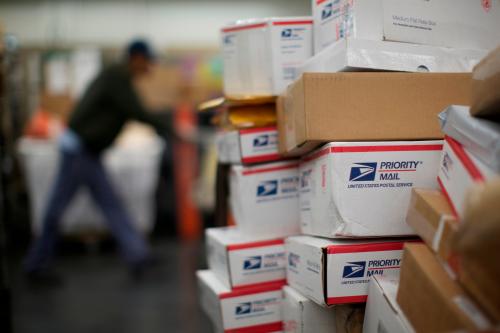President Donald Trump’s aim to dismantle the United States Postal Service (USPS) to prevent voting by mail is not only an attack on fair and equitable voting and the democratic process. It is also an attack on the Constitution, U.S. veterans, and racial equality.
Trump stated, “They [Democrats] want 25 billion dollars—billion—for the post office. Now, they need that money in order to have the post office work so it can take all of these millions and millions of ballots. But if they don’t get those two items, that means you can’t have universal mail-in voting because they’re not equipped to have it.”
Despite political posturing on Capitol Hill, the ask for funding is actually coming from USPS itself as well as some political appointees who Trump put in place. Additionally, the ask comes from the American public. Over 75% of Republicans and Democrats approve of COVID-19 stimulus funding being used for USPS. USPS has an over 90% approval rating among Americans—the highest of any government agency.
What Trump and other critics of USPS seem to be missing are the people with disabilities and senior citizens who won’t get timely medical prescriptions. They are forgetting the rural Americans who won’t get the mail to run their businesses, or the mail from loved ones that is critical for mental and emotional well-being during a global pandemic. But, it is deeper than this. Rural America, including American Indian reservations, will literally shut down. USPS is the only mail service that delivers to every address in the United States. Americans understand the importance of USPS.
In addition, thousands of postal workers’ jobs will be impacted. A large percentage of USPS workers are military veterans and/or Black people. Nearly 20% (over 100,000) of USPS employees are veterans. USPS employs veterans at three times their percentage of the U.S population. Over 20% of USPS employees are Black. And, many are both Black and a veteran. About one in six USPS workers are either Latino or Asian. Over 30% of USPS workers in western states including California, Arizona, Nevada, New Mexico, and Hawaii are either Latino or Asian. USPS also has an increasing percentage of women employees (40%).
A quick historical note is important here: As soldiers returned from WWII and Vietnam, USPS provided an avenue to the middle class for veterans. This was particularly true for Black veterans who were systematically blocked from educational and professional opportunities to actualize the American Dream. In this regard, attacking USPS is an affront to the pursuit of racial equality. However, this isn’t only a historical phenomenon. Veterans from Middle Eastern wars also compose a sizable percentage of USPS workers.
Furthermore, USPS is not bipartisan; it is non-partisan. However, Trump has aimed to change this. Despite conflict-of-interest concerns, Trump selected Louis DeJoy as the new Postmaster General earlier this year. DeJoy is the local finance chairman for the 2020 Republican National Convention and was one of the 2017 Republican National Committee deputy finance chairmen along with Michael Cohen and Elliot Broidy. He is also a major donor to President Trump and other Republicans. As a private CEO, DeJoy’s company contracted with USPS for 25 years. However, he has no government experience in this type of role.
Since starting in May, DeJoy has initiated sweeping changes to USPS with the stated goal of helping it be more fiscally sound. Critics, however, say these changes will delay mail and directly impact the November 2020 presidential election, an election in which mail-in balloting will be at historic highs. Critics may be right. There are reports of long mail delays from Washington, D.C. to Washington state. DeJoy said in a recent Senate hearing that he will suspend further changes to USPS until after the election.
Though it is true that USPS does not turn a profit, its financial deficit is mostly attributable to a 2006 reform mandating that the agency pre-pay the pensions of future retirees. As a response to financial issues, USPS has decreased its full-time, benefited employees from over 750,000 in the mid-1990s to under 500,000 today. USPS has also aimed to reduce its physical footprint to reduce costs. USPS facilities have decreased about 10% over the past two decades to under 35,000. Yet, this reduction is complicated by an annual increase of about one million P.O. boxes.
For those who wish to make the false comparison of USPS to private companies, it would rank in the top 50 of private companies based on revenue. Twenty percent of Americans still pay their bills via mail, especially the elderly and those living in rural America. Churches also receive a large percentage of their tithes and donations via mail. This is especially true during a global pandemic. However, the increase in digital mail and delivery services like Amazon, FedEx, and UPS has led to a 20% decrease in USPS mail over the past decade. But, deals with these private mail delivery companies accounts for a sizable percentage of USPS revenue.
Altogether, based on the Constitution, all of the fiscal responsibility talk about USPS is a moot point. Simply put, USPS should not be viewed as a casualty of financial inefficiencies as much as it should be viewed as a constitutional public good—a public service—that is necessary for democracy and deserves adequate funding to fully operate for the American people.
The Brookings Institution is committed to quality, independence, and impact.
We are supported by a diverse array of funders. In line with our values and policies, each Brookings publication represents the sole views of its author(s).








Commentary
Why Trump’s attack on USPS is an attack on the Constitution, democracy, and racial equality
August 24, 2020